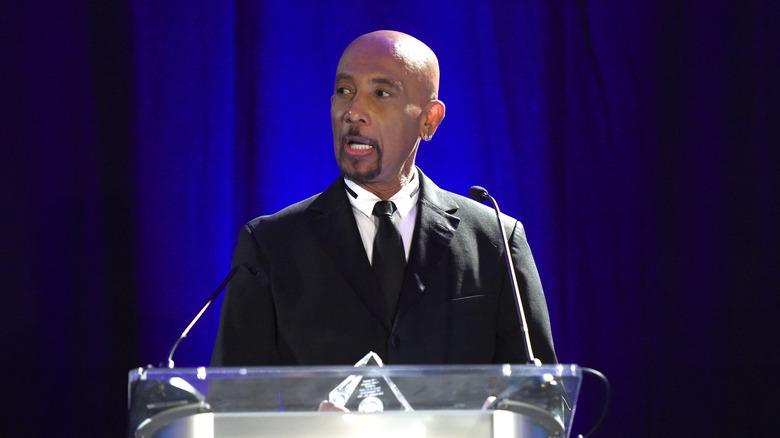Montel Williams' History With Multiple Sclerosis Explained
Montel Williams was a staple of '90s television. You didn't have to watch his show to recognize his easy smile or the measured tone he used when interviewing the people on his show. Covering everything from family scandals to inspirational true stories to psychic readings, "The Montel Williams Show" epitomized reality television, a genre fraught with its own unique brand of difficulty, in the 1990s and early 2000s.
But through it all, Williams was dealing with an internal struggle just as severe — and sometimes worse — than what audiences saw on his show. When interviewed by Dr. Oz on OWN in 2009, Williams revealed that at the height of his show's popularity, he would record a segment and then go backstage and cry. He said he would then "let it go, refocus, and come back". The man known for maintaining grace and dignity in front of the camera, no matter the energy of his segments, was in pain through every minute of his day.
That pain is still with Williams today. He is an outspoken advocate for multiple sclerosis research and understanding, with an emphasis on the condition's highly individual nature. It is this nature that can make the disease so hard to spot. And it's part of why Williams himself went more than a decade without a diagnosis other than a recommendation to "lose weight" to ease the extreme pain he sometimes felt.
Williams' first prognosis
The first symptom that Montel Williams can remember is going blind in his left eye for seven months in 1980. He recounted the story of this first symptom in a speech covered by Multiple Sclerosis News Today in March of 2020. When this first symptom hit Williams, he was in the U.S. Naval Academy. Although he attended graduation and threw his cap, he would never receive the commission he trained for.
Williams would also not be able to obtain a degree in aviation for the same reason. His vision would come and go, often in one eye at a time, as his overall eyesight grew worse. This landed him a position as a naval intelligence officer. Every few months, Williams recalled, he would go to the doctor and get the same advice: lose weight. It wasn't until Williams left the Navy that he received an actual diagnosis.
In fact, Williams was eight years into his show's 18-year run when he called a press conference to announce his multiple sclerosis diagnosis (via CNN). At the time, his personal physician, Dr. Michael Olek, gave reporters and fans a reassuring if not sunny outlook. It was a far cry from the first one Williams received with his diagnosis. His first doctor's prediction was that Williams would be wheelchair-bound within six months. His pessimism infuriated Williams, who was sure there had to be other options.
Symptoms and warning sighns
Before Williams could explore treatment options, however, he had to research what he was up against. Multiple sclerosis is often mistaken for a muscular issue or even a problem with the circulatory system, thanks to the kind of pain the condition produces. But MS is neither. Instead it is an issue with the central nervous system. As the National Multiple Sclerosis Society explains, researchers aren't sure why, but when a person develops MS, their immune system begins to destroy their myelin, the protective coating that surrounds every nerve in the body. As the myelin breaks down, communication between the brain and body is interrupted. Signals throughout the body also get jumbled or lost, resulting in chronic pain.
The Mayo Clinic lists this pain as one of the condition's main symptoms. Certain neck movements can set off a wave of pain, especially when the neck is bent forward in a reaction known as a Lhermitte signal. MS flare ups can also cause limbs to become weak or go numb. The effect usually hits one side of the body at a time, or it may affect just the lower half of a patient's body. As in Montel Williams' case, MS can also cause vision issues. One eye at a time may experience partial or total vision loss, while movement of that eye becomes painful. Other potential vision changes include blurred vision or double vision that lasts for an extended period of time.
Multiple sclerosis is a personal condition
Since his first press conference on the topic, Williams has been very transparent about the symptoms of his MS. He has spoken on the pain he feels and the difficulty he faces in doing everyday tasks, particularly those that require him to stand for long lengths of time. To many fans' surprise, however, Williams has been less upfront about how he manages his symptoms. And there is one very good reason for that.
Speaking to Multiple Sclerosis News Today, Williams explained that he once made the mistake of naming a medication he was on. Viewers with MS began asking for it, even though it might not have been the best choice for their specific situation. For the next year, Williams was faced with doctors asking him to avoid sharing treatment specifics in the future.
It's a message Williams has taken to heart. He will give general information on his management practices but he won't give details on things like diet or medication. Each patient, he says, needs to find their own treatment methods. In Williams' case, these include medications and a holistic approach to diet, exercise, and mindfulness. Williams has also been open about his use of medical marijuana to treat the condition's painful symptoms. Emerge, a site focused on cannabis news and policy reform, profiles him as a long-time advocate as far back as the '90s.
Holistic treatment trends
Although each MS patient has to treat their condition differently, the National Center for Complementary and Integrative Health is quick to point out that some common treatment suggestions likely won't work. These methods have either never been researched or the results are mixed at best, negative at worst.
Options like bee venom therapy, which requires the patient to be stung by at least one bee, carry risks like anaphylactic shock and carry no known benefits. Others, like yoga and reflexology, carry little up front risk and may help reduce pain, fatigue, and can improve a patient's mental outlook. And others, like ginkgo and fish oil, can potentially cause interactions with prescription medications while offering no known benefit.
But there are some holistic options that may help patients, including medicinal cannabis. There are few studies on the substance but this is largely due to its current status as a federally prohibited substance. As the National Center for Biotechnology Information stated in a 2017 publication, cannabis has a lot of medical potential that cannot be fully researched due to federal restrictions.
Until the federal policies are changed, the substance most supported by MS research is vitamin D. Preliminary studies have found that it seems to slow the spread of the disease, but researchers are quick to point out that the findings are still in the early stages.
Moving forward
Multiple sclerosis might leave Montel Williams in pain all day, every day. But he isn't showing any signs of slowing down. His IMDb page lists several projects currently in the works, including a rumored part in the upcoming medical cannabis documentary "Searching for the Cure." Multiple Sclerosis News Today reports that he is continuing his work in MS advocacy, specifically focusing on a form of the condition known as secondary progressive multiple sclerosis. Known as SPMS, this stage of MS is marked by chronic pain and a loss of the remission stages that are common in many patients with earlier forms of MS. Williams himself has SPMS, affecting his everyday life as well as his advocacy.
In all of his interviews and the speaking engagements where he appears, Williams is emphatic about one point. MS is a highly personal disease. No two people are going to handle it the same way. One person may never need a wheelchair, while another's life might be improved by one. Some patients experience periods of remission their whole lives, while others find their symptoms slowly getting worse over time with little they can do about it. He urges all MS patients and their families to approach the condition by looking at what is best for the specific patient, not by looking at the methods that others use. It is the best way to improve the treatment and the quality of life for each MS patient as researchers work to find a cure.






